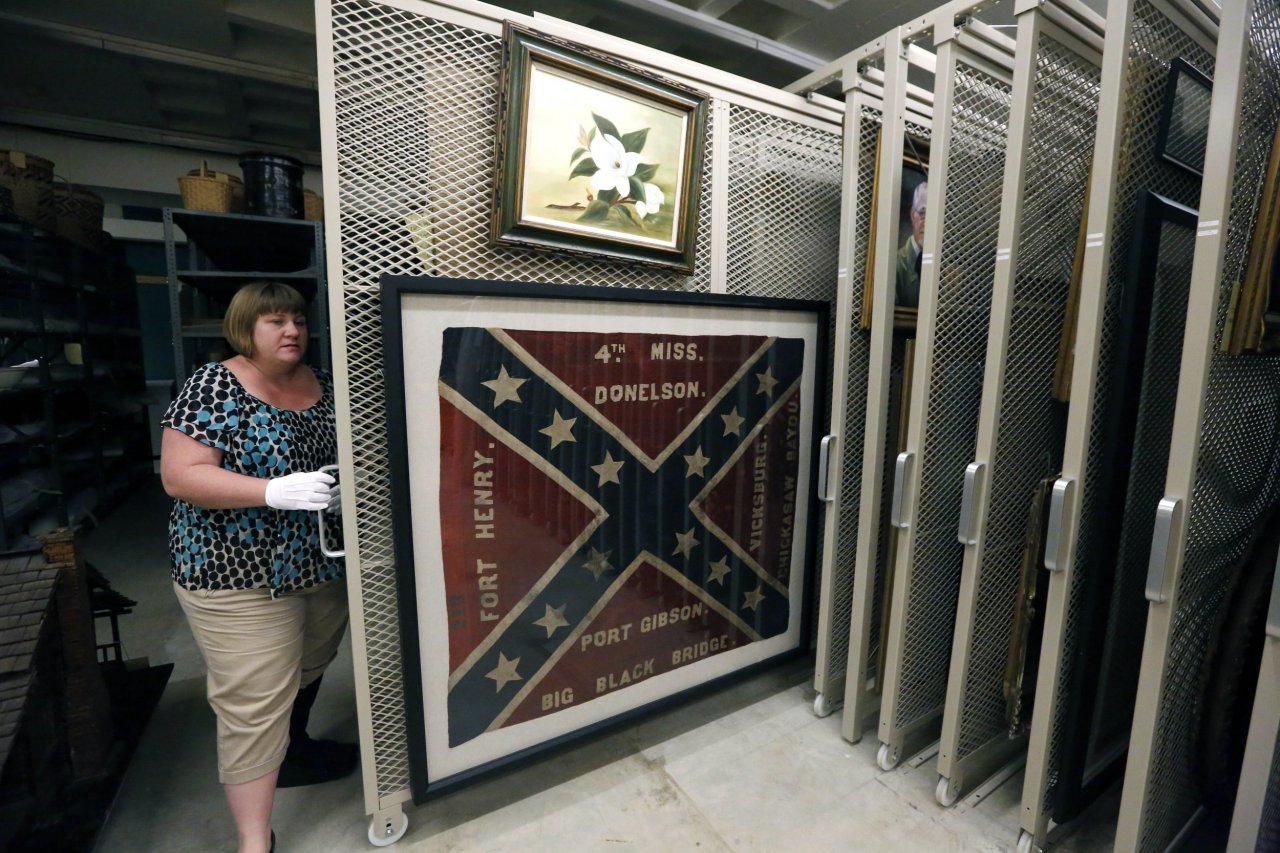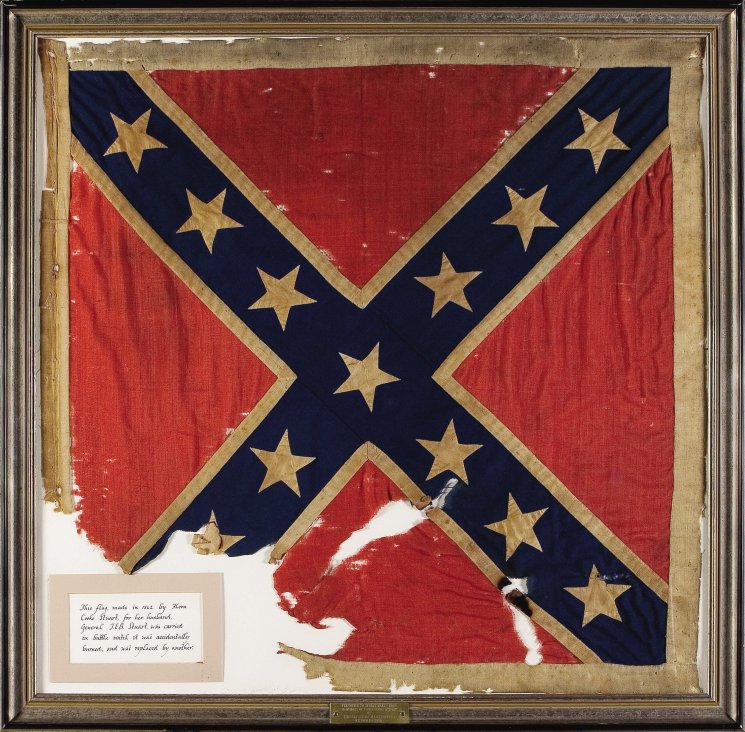It was April 1865 and the Union had just declared victory. A rebel soldier with the 9th Virginia Cavalry was preparing to hand over his weapons. He kept only the clothes on his back and, in a final act of rebellion, hid a Confederate battle flag by tying it around his torso. Over a century later, the flag, deemed one of the rarest relics from the Civil War, sold for $82,000 at auction.
For years, the Confederate flag has served as a powerful symbol, one that's meant wildly different things to different folks. For some, it harks back to the old South, for others it's a reminder of the sanctity of states' rights. For memorabilia enthusiasts, the flag is an intriguing antiquity, while for another ilk it's a decal to put atop a Dodge Charger that proudly proclaims membership in Redneck Nation.
But for white supremacists, the Confederate flag represents a preferable alternate reality, one in which the South won the Civil War and slavery was never abolished. Debate about the Confederate flag's true meaning flared up after Dylann Roof was arrested in connection with the Charleston, South Carolina, church killings, in which nine African-Americans were gunned down in the middle of Bible study. Roof, a self-proclaimed white supremacist, authored a racist manifesto that has photographs of him holding the Confederate flag, posing in front of a Confederate museum and visiting a Confederate cemetery.
Legislators rushed to debate whether the flag ought to be taken down from statehouse flagpoles, and many businesses removed the flags from their shelves. Even reruns of the late-'70s TV show The Dukes of Hazzard, in which the car driven by the main characters is emblazoned with a Confederate flag, were dropped from the TV Land schedule because of the controversy. All the while, Confederate memorabilia collectors squirmed.
Experts estimate that there are only 20 to 50 authentic Confederate battle flags on the private collectors' market today. These flags, also called the rebel flag and colloquially called the Confederate flag, are marked by a large blue 'X' and adorned in white stars. Though this flag is today primarily associated with the Confederacy, it was only the flag used during combat. It was rejected as official flag of the Confederate States of America, which used four other flags, all variations of the American flag. Nonetheless, that battle flag is the enduring icon of the Confederacy.
Related: Nab Some Civil War Memorabilia or a Jar of Elvis Presley's Hair at Heritage Auctions
These flags were often destroyed by Union soldiers following a battle that went in the North's favor. Others were turned over to the United States Congress and eventually made their way into the Museum of the Confederacy in Richmond, Virginia. The remaining flags wound up at auction, though a few are believed to be with the families of the soldiers who brought them home after the war.
Rarity is usually a good thing for collectors, but memorabilia experts say the Confederate flag market is "softening"—a polite way of saying sales are plummeting. And that can't be pinned on the recent controversy. In 2007, a Confederate flag in moderate condition commanded $77,000 at Heritage Auctions in Dallas. A similar flag brought only $50,000 in 2010. "Had it sold at the same auction in 2007, it would've been in the $77,000 price range as well," says Marsha Dixey, the consignment director for the auction house. Heritage, founded in 1976, boasts over $900 million in revenue a year and employs hundreds of memorabilia experts. It's also the largest collectibles auctioneer in the world, which is why so much Civil War memorabilia ends up there.
A lot of factors contribute to the changing market, the most obvious being the economic downturn of 2008. However, the generation that typically collected Civil War memorabilia in general—and Confederate flags in particular—is also dying out without being replaced by a younger generation of collectors. "A 40-year-old is not as interested as an older person who remembers their grandfather talking about the war," Dixey explains.
Collectors say the culture is also changing. "It has a lot to do with political change, especially with what happened recently with Charleston. That will impact flag sales," explains Michael Collins, executive director of the Civil War Antiques Preservation Society. "That flag should never have been flying on the statehouse. It's a battle flag, and that sends the message that you are going against the Union."
He says backlash against antique Confederate flags has changed the policies of auction houses. Some houses often specify what kinds of items they will and will not trade in: Ivory and looted items are among common items auction houses refuse to sell under their social responsibility policy. The largest and most venerable auction houses in the world, Sotheby's and Christie's, rarely deal in Confederate flags. "They want to make it clear that they do not agree with the philosophies associated with the flag being offered up for sale," says Collins.
With the biggest auction houses voluntarily out of the game, two houses—Heritage and James D. Julia Incorporated, based in Fairfield, Maine—have established themselves as the leaders of the Civil War market. Heritage deals in so much Confederate memorabilia that a change in its sales policy regarding flags could radically alter the market. Collins says that if it refuses to handle them, "It would actually drive the price [of memorabilia] up because then there would be a very limited place to buy and sell such items."
James D. Julia sells only about 3,000 items a year, but that inventory includes some of the rarest collectibles in the world. A planned October auction will include the only flag known to have been carried by both Confederate soldiers and marines during the Civil War. John Sexton, one of the nation's leading experts in Confederate memorabilia, estimates that even in the softened market, this flag could bring as much as $250,000. "The market can never really hurt rare and desirable objects, even if there's a lack of interest and lack of demand," he explains.
"Confederate flags are still pieces of history," says Sexton. "It's a shame that some racist fool used a mass-produced prop in his violence. But this is still a great, iconic piece of American history that turned out to be on the losing side."
When asked if he would ever ban the flag from his auctions, auction house owner James D. Julia said he would not, just as he has not banned Nazi memorabilia. "I deal in historical items, not symbols," Julia explained. "People who buy these things are institutions, museums, major collectors. They are not reinventing the pre–Civil War South. I understand why some firms don't handle them—because it's not politically correct. But if we did this with relics of every generation that happened before us, we would have no history left. We would know nothing."


















